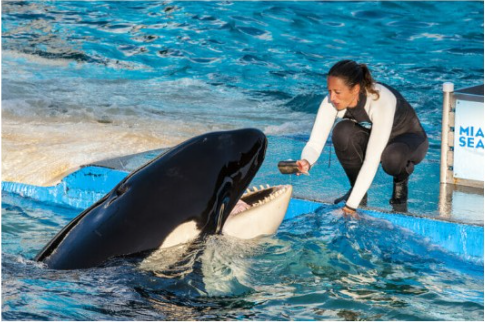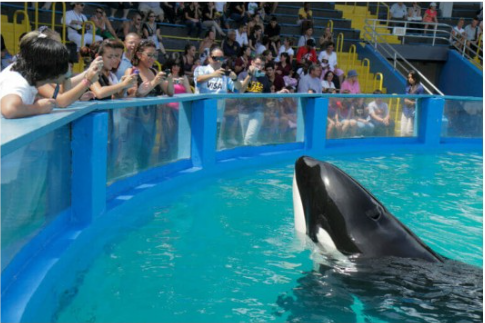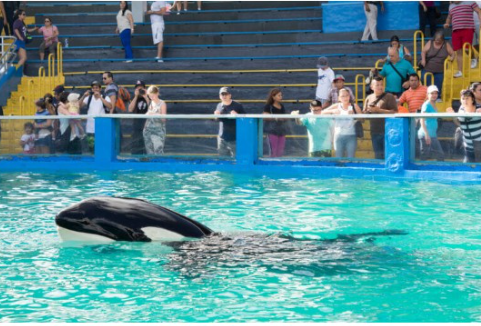Whether marine mammals like orcas and dolphins should be kept in captivity has long been debatable. Orcas being held in detention and performing in performances at marine parks like SeaWorld was previously a widely acceptable practice, but attitudes against it are changing.
Many orcas have continued to live in captivity despite the passage of numerous new regulations and protections, despite the efforts of activists to ensure that they are treated more humanely.
Lolita, one of the most well-known of these animals, has been kept in captivity at the Miami Seaquarium since 1970. Animal rights advocates have sought rescue because she suffered abuse while held captive.

After so many years, Lolita the orca will finally be allowed to return to her home waters.
Lolita – captive orca
The second-oldest orca in captivity is Lolita, also formerly Tokitae. Her age is estimated to be 57. In 1970, she was apprehended in Puget Sound, Washington.
She was bought by Miami Seaquarium, where she performed in public presentations for decades as their main draw.
Hugo, Lolita’s partner, repeatedly bashed his head against the tank’s side before passing away in 1980 from a brain aneurysm.
Animal rights advocates have been campaigning for Lolita’s release for years, arguing that her confined tank was inadequate and that she should be set free.

“She’s almost 20 feet long and has been in the water 20 feet deep. She has been unable to dive for fifty years,” Howard Garrett of the Orca Network told KOMO News.
Thousands of protesters gathered outside the Miami Seaquarium in 2015, as the hashtag #FreeLolita gained popularity on social media. The Lummi Nation, a Native American tribe from the Pacific Northwest, has also demanded her return to her home waters in Puget Sound.
Lolita’s health had gotten worse in recent years. The Miami Seaquarium stated last year that she will no longer participate in performances or be visible to the general public.
Lolita finally freed
An agreement to free Lolita from prison has been reached after more than 50 years since her kidnapping.
According to Reuters, the Miami Seaquarium, now run by The Dolphin Company, and the nonprofit Friends of Lolita have come to a “formal agreement” under which they would move Lolita to an ocean environment in the Pacific Northwest within two years.
According to KOMO News, CEO Eduardo Albor stated, “It has always been our mission at The Dolphin Company that we place the utmost premium on the well-being of animals, above anything else.” One of the factors that drove us to purchase the Miami Seaquarium was the desire to secure a better future for Lolita.
Lolita The Orca In action

Lolita’s owners reported that she was receiving 24-hour veterinarian care and that her “energy, appetite, and involvement in everyday activities is becoming pretty stable.”
The announcement has been good news for animal rights campaigners who have been campaigning for Lolita’s liberation.
NBC Miami quotes a statement from PETA that reads, “If Lolita is eventually returned to her home seas, there will be celebrations from all over the world, especially from PETA, which has fought numerous cases on Lolita’s behalf and pummeled the Seaquarium with protests seeking her liberation for years.
” If the Seaquarium agrees to relocate her, it will give the marine animal the much-needed break she has been craving after spending the last five unhappy decades in a tiny tank and signal to other parks that the era of keeping brave, highly intelligent marine mammals in gloomy cages is ended.
A Lummi representative told KOMO News, “We are pleased to learn that our relative, Sk’aliCh’elh’tenaut (Toki’tae), will have the chance to come home.” She “represents the story of all Native Americans who have been the victims of genocide and the horrible policies that were implemented to ‘kill the Indian and save the man,'” according to the author. She also symbolizes our power, resiliency, and need for healing, which is more significant.

It takes skill to release an animal from captivity, especially one as sensitive as Lolita the Orca, who has lived in prison and is older than most orcas in the wild.
But Howard Garrett told KOMO that Lolita was more likely to be kept in a protected cove in the Puget Sound rather than released into the wild. She will return to her familiar waters with much more freedom to swim and the ability to hear the cries of other Southern Residents orcas.
Contrary to popular belief, he assured the source, “I think she’ll be quite delighted to be back and it will be therapeutic for her.”
We are delighted that Lolita will finally be released from captivity and go back to her native waters after more than 50 years! Share this fantastic news, please!
Read more articles here

